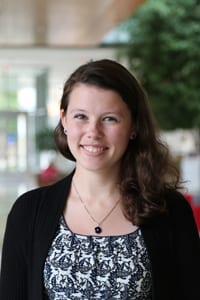When Amani Gillette got her first biology research experience in 2010 as a Madison La Follette High School junior, it completely flipped the script on what she thought science was all about.

As part of the biotechnology youth apprenticeship program, Gillette was placed in the lab of UW–Madison scientist Margaret McFall-Ngai, who spent decades studying the tiny Hawaiian bobtail squid, which has a beneficial symbiotic relationship with bacteria called Vibrio fischeri. Gillette was put to work studying a single squid protein that acted strange when the bacteria was present.
The lab had no idea what role the protein played or even whether it was important. The act of not knowing — and asking why — permeated all of the work in the lab.
“Whenever you’re doing science in classrooms, it’s very procedural. There’s a right and wrong answer,” Gillette says. “It’s not what science is like in real life, where you could spend months doing the same thing over and over again and changing just one variable, until something finally clicks.”
Gillette embraces the unknown in basic science. Today, she is a graduate student in the lab of Morgridge Institute medical engineering investigator Melissa Skala, where she uses fluorescence lifetime imaging to learn more about cancer growth and treatment. But she hasn’t forgotten about the power of that high school experience, and today is one of Morgridge’s strongest ambassadors for science outreach.
Gillette’s mentees are high school students through the same Dane County Youth Apprenticeship Program (YAP) she participated in. The students spend more than a full year with the lab, often working full-time in summers, and are assigned many of the same complex tasks as graduate students. Her first two students have been co-authors on published research, and both of them attended the international SPIE conference in San Francisco and presented their work.
“As soon as you get involved in research, the first question is often, ‘why don’t we know the answer to this?’” says Gillette. “It may seem like a basic question, but the answer may be complicated or we haven’t had the tools to discover it before. It’s really interesting to figure out how much still needs to be discovered.”
Meet the Lab
Meet The Lab is a collection of educational resources for middle school science classrooms, and is a collaboration between PBS Wisconsin Education, Wisconsin Institute for Discovery, Wisconsin Alumni Research Foundation and the Morgridge Institute for Research. This collection introduces students to relevant real-world issues, cutting edge research and the human element—the people working together to research, innovate and solve problems using science.
Gillette is also giving young students a taste of exploring the unknown through a new program called “Meet the Lab,” which is a partnership between PBS Wisconsin and the Discovery Outreach team. Meet the Lab is a collection of online science education resources for middle school students that introduces them to real-world science issues and the process by which scientists seek answers. The Skala Lab was one of the first labs showcased, and Gillette helped develop much of the curriculum.
Gillette recreated a detailed process showing students how they can detect patterns in cells, a key step toward recognizing cancerous cells. She has the students start by looking at healthy pancreas and breast cells, then contrasting those with their cancerous counterparts. They are able to see that the pancreas cancer cells look lopsided and have their nucleus pushed to one corner of the cell; the breast cancer cells tend to clump together.
She also shows them the technology they use to measure metabolism in cells, illustrating how normal and cancerous cells consume energy differently. Finally, she threads the needle on how metabolism could be a target for fighting cancer, and the importance of using control tests on healthy cells.
Travis Tangen, Discovery Outreach educational programs manager and liaison to the PBS program, says Gillette’s pattern recognition exercise has been presented at online field trips, with strong success. “Clearly this was a complex topic, but Amani’s skills in communication of her science helped to make this abstract concept not only real for middle schoolers, but gave them an opportunity to participate in a scientific practice.”
Gillette — an avid distance runner who has completed numerous half and full marathons, and last spring completed a 32-mile ultra-marathon — has definitely made a long-term commitment to science outreach. She also regularly does half-day tutorials on cancer metabolism for the Morgridge Institute’s Rural Summer Science Camp. She hopes to continue outreach beyond here academic career.
Ava VanDommelen, a UW–Madison junior majoring in biology and psychology, was Gillette’s first mentee at Morgridge. She says it was a pivotal experience for her.
“I had the opportunity to work with Amani as both a high school and undergraduate student, and the valuable experience impacted my academic career through deepening my appreciation for scientific research and teaching me firsthand the value of perseverance and hard work,” VanDommelen says.
